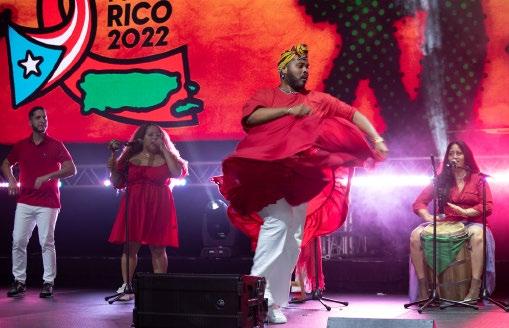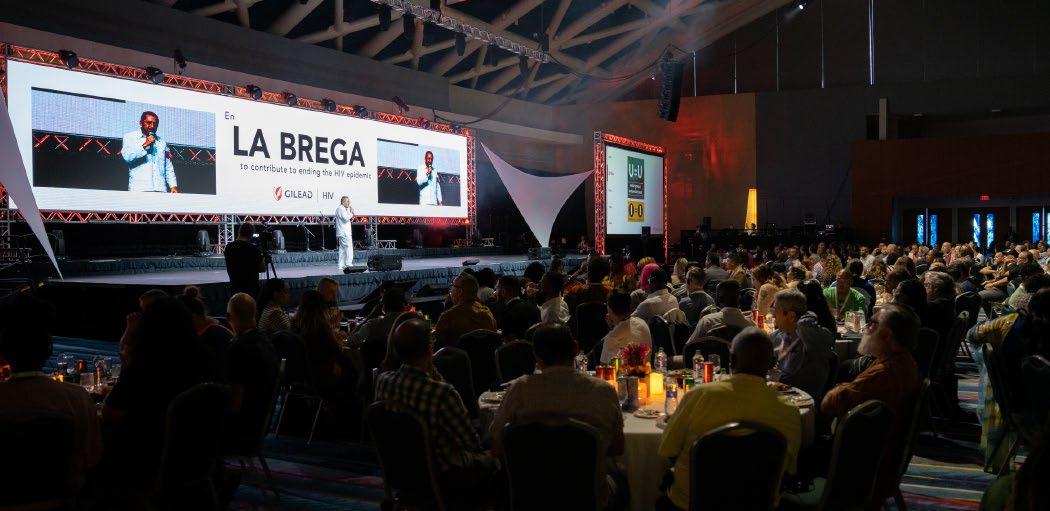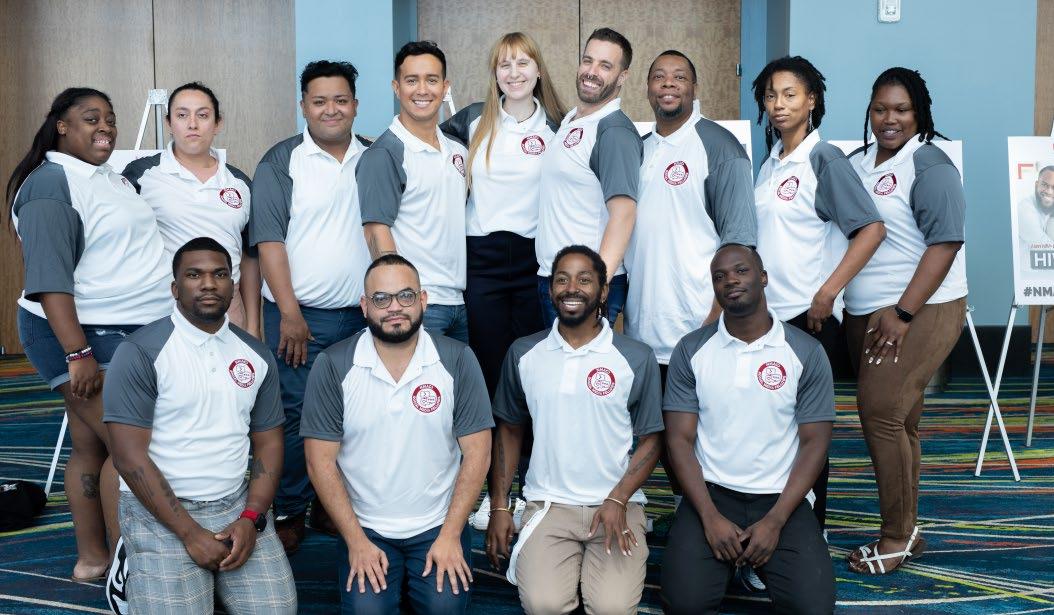OCT 8-11, 2022
San Juan, PR
Puerto Rico Convention Center uscha.life
programa/PROGRAM

IMPACT REPORT
#2022uscha
US Conference on HIV AIDS
NMAC leads with race to urgently fight for health equity and racial justice to end the HIV epidemic in America. The United States Conference on HIV/AIDS (USCHA) is the largest HIV-related gathering in the United States, bringing together thousands of participants from all segments of the HIV epidemic.

This year was the 26th annual USCHA and the first in-person conference since before the start of the Covid-19 pandemic. With a theme of “Fighting For Our Lives,” this year’s conference brought together more than 3,200 people in San Juan, Puerto Rico to focus attention on HIV in the Latinx community and the cultural barriers that can hinder effective HIV outreach and care delivery.
USCHA offered more than 150 training sessions at three levels of instruction (beginner, intermediate, and advanced).
Beginner levels were primarily didactic. Intermediate level sessions were didactic and interactive, while advanced level sessions were designed to maximize interaction between attendees and participants.
 US Conference on HIV AIDS
US Conference on HIV AIDS
HIV in Puerto Rico and Latinx Communities


The 2022 Opening Plenary highlighted HIV in Puerto Rico and Latinx communities with a focus on gay men. To end the HIV epidemic by 2030, NMAC believes our movement needs to not only understand, but also celebrate the cultures of the communities hardest hit by HIV. Latinx Gay men have surpassed White Gay men in the number of new cases of HIV. They are second in numbers only to Black Gay men. This plenary was held in Spanish with simultaneous English interpretation. The session gave attendees an immersive experience of the culture, music and food of Puerto Rico.
The San Juan Host Committee presented a reception to welcome USCHA attendees to Puerto Rico. Local music filled the Puerto Rico Convention Center ballroom and terrace as attendees danced and mingled on a beautiful night in San Juan.


Celebrating the Art of La Brega to Help End the HIV Epidemic



“La Brega” loosely translates to “the hustle” or “the struggle.” It speaks to the tenacity and ingenuity that the Puerto Rican people demonstrate when responding to life’s challenges. La Brega expresses a sense of solidarity and pride in the way Puerto Ricans face and overcome adversity. While there have been significant obstacles since the beginning of the HIV epidemic, the community continues to persevere and lead the way toward a better future. Even with the unprecedented challenges brought about by the COVID-19 pandemic, the HIV community has responded with characteristic determination and innovation. This plenary luncheon celebrated La Brega and the unwavering resolve of the HIV community to help bring about the end of the HIV epidemic.

Love In Gravity



The love we have. The love we give. The love we hold. Love In Gravity is six original stories featuring some of your favorite actors, set everywhere from the halls of a Miami high school to a six train barreling through the Bronx. It’s all about the forces we exert on each other that draw us together and sometimes push us apart. This plenary took attendees on a journey and gave them a glimpse of Love in Gravity; a collection of six original stories from the gay and queer Latinx and Afro-Latinx community. Stories of love, heartbreak, intimacy, and family – the places we can find each other, the places we find ourselves.

The Federal Response to the Emergence of Monkeypox

During this plenary, leaders discussed the federal response and gave recommendations on the role of the HIV Community in the fight against Monkeypox.



• Registered attendees: 3,312

• Exhibitors: 168
• Speakers: 103
• Host Committee: 92
• GLOW: 3
• Youth Scholars: 36
• 50+ Scholars: 48
• Social Media Fellows: 16
• Gay Men of Color Fellows: 5
• SCOTUS: 14
• Scholarships: 156
• Volunteers: 91
NMAC’s 50+ Strong & Healthy Program trains older adults living with HIV and other Long-Term Survivors on how to advocate for themselves and their communities. The program includes a peer health education component, webinars, mini-grants, and social media advocacy campaigns. As in previous years, our program launched at USCHA, where fifty 50+ Scholars from across the U.S. came to Puerto Rico to attend workshops and sessions related to HIV and aging and participate in community-building activities specifically dedicated to them.
NMAC’s Treatment Division partnered with Waves Ahead/SAGE Puerto Rico, Roc4Aging+, The Well Project, The Reunion Project, and the National HIV & Aging Advocacy Network (NHAAN) to organize the HIV 50+ and LongTerm Survivors lounge. In this space, program participants and community members were able to network with peers and engage in meaningful conversation about aging, but also sit back and enjoy a massage, practice meditation, or immerse themselves in the relaxing sounds of music therapy.
In addition to the lounge, NMAC curated a pathway of workshops focused on HIV and aging. Among the topics covered were the experiences of PLWH since birth, campaigns to improve mental health among older LGBTQ+ adults, public policy and advocacy efforts, and issues affecting 50+ individuals in Puerto Rico.

NMAC’s Youth Initiative, sponsored by ViiV Healthcare, recruited 27 young adults (referred to as scholars) between the age of 18-25 from across the United States of America to participate in the 2022 USCHA in San Juan, Puerto Rico. Eighty-seven percent (87%) of scholars had never attended USCHA previously. Scholars received a full scholarship to attend USCHA that included round trip airfare, hotel accommodations and a stipend.


While at USCHA, scholars were not only able to attend plenary sessions and workshops, but they also participated in a specialized HIV advocacy and prevention training designed to empower young leaders in the HIV workforce. Among the scholars in the program, 71% are employed at organization that provide HIV education, medical care, or prevention services. This specialized training included topics such as stigma, epidemiology, medical mistrust, social determinants of health and health communication & literacy. After the conference, scholars will receive mini-grants to plan and facilitate their own HIV community projects within their communities related to HIV prevention, treatment or advocacy.
The Gay Men of Color Fellowship, a program developed by NMAC’s Treatment division, provides community members with social media marketing tools to help them develop sciencebased messaging centered on PrEP, PEP, and TasP for MSM. The campaign is designed to reach the members’ networks and provide necessary tools to continue this work after the program ends.
GM OC FELLOWSHIP
GAY MEN OF COLOR FELLOWSHIP BIOMEDICAL HIV PREVENTION
Fellows were able to participate in USCHA to expand their knowledge and leadership in the biomedical HIV prevention field. They supported the dissemination of information by making social media posts about the sessions they attended.
NMAC’s Treatment Division partnered with Waves Ahead/SAGE Puerto Rico, Roc4Aging+, The Well Project, The Reunion Project, and the National HIV & Aging Advocacy Network (NHAAN) to organize the HIV 50+ and LongTerm Survivors lounge. In this space, program participants and community members were able to network with peers and engage in meaningful conversation about aging, but also sit back and enjoy a massage, practice meditation, or immerse themselves in the relaxing sounds of music therapy.
Other lounges offered included the PLWHIV Lounge, the Trans Lounge, and the Youth Lounge.

Each year, 18 Social Media Fellows are selected to attend USCHA. Fellows use their social media skills to help spread the word about HIV prevention, care, and treatment and expand their abilities through interacting with others in the field. Through interaction with peers and other USCHA attendees, the Fellows enhance their skills and their understanding of the epidemic.

Nearly 90 companies, organizations, and providers took part in the USCHA Exhibit Hall, offering attendees an opportunity to learn more about their services.


Institutes are in-depth sessions that focus on the issues of impacted populations and interest groups. This year’s topics included faith, trans issues, monkeypox, housing, substance abuse, and race/ethnicity issues. Institutes are conducted by conference partners and NMAC’s Constituent Advisory Panel members.


Age Range
USCHA showcased over 30 poster presentations, covering the topics such as expanding ART, linkage to care, long-acting injectables and Teen PrEP Marketing campaigns.


*Numbers are representative of USCHA participants that disclosed their demographic information. Does not include entire attendance.

0 100 200 300 400 500 600 700 800 65+ 55-64 45-54 35-44 26-34 20-24 Under 20
0 100 200 300 400 500 600 700 800 Not listed Prefer Not to Disclose Pre ero no revelar Native Hawaiian/ Paci c Islander Nativo de Hawái o de las islas del Pací co Latina/o or Hispanic Latina/o o Hispano Caucasian/ White Caucásico o blanco American Indian or Alaska Native / Indio americano o nativo de Alaska Asian Asiático AfricanAmerican/Black Afroamericano o negro
Ethnicity/Etnia
Sexual Orientation/Orientación sexual
Hetero-

sexual Gay
Queer Prefer Not to Disclose Pansexual
Same Gender Loving Amante del mismo género
Two Spirit dos espíritus
0 100 200 300 400 500 600 700 800 Prefer
Prefer Not to Disclose
Disclose Pre ero
no
0 200 400 600 800 1000 1200
Same
Two Spirit dos espíritus
Gender Loving Amante del mismo género
Lesbian Lesbiana Heterosexual Gay Bisexual Asexual
0 100 200 300 400 500 600 700 800
Pre ero
Questioning En cuestionamiento divulgar
no
Trans Woman
Trans Man Hombre trans Male Hombre Gender Non-Binary Género No binario Gender Queer Género queer Cis Female Mujer cisgénero Cis Male Hombre cisgénero
Women Mujer Two Spirit dos espíritus
Mujer trans
0 200 400 600 800 1000 1200
Gender Identity/Identidad de género
Questioning En cuestionamiento Bisexual Asexual
Queer Prefer Not to Disclose Pansexual Lesbian Lesbiana
divulgar
Trans Woman
Trans Man Hombre trans Male Hombre Gender Non-Binary Género No binario Gender Queer Género queer Cis Female Mujer cisgénero Cis Male Hombre cisgénero
Sexual Orientation/Orientación sexual
Not to
Women Mujer Two Spirit dos espíritus
Mujer trans
Gender Identity/Identidad de género
*Numbers are representative of USCHA participants that disclosed their demographic information. Does not include entire attendance.
Age Range
HIV Status/Estado del VIH:
*Numbers are representative of USCHA participants that disclosed their demographic information. Does not include entire attendance.

0 300 600 900 1200 1500 Undeclared / No declarado Unknown/ No se sabe Person Living without HIV / Persona que NO vive con VIH Person Living with HIV/ Persona que vive con VIH
0 100 200 300 400 500 600 700 800 65+ 55-64 45-54 35-44 26-34 20-24 Under 20
0 100 200 300 400 500 600 700 800 Not listed Prefer Not to Disclose Pre ero no revelar Native Hawaiian/ Paci c Islander Nativo de Hawái o de las islas del Pací co Latina/o or Hispanic Latina/o o Hispano Caucasian/ White Caucásico o blanco American Indian or Alaska Native / Indio americano o nativo de Alaska Asian Asiático AfricanAmerican/Black Afroamericano o negro Ethnicity/Etnia
The informa0on provided prior to the conference were useful

Disagree Undecided Agree
The conference staff met my expecta0ons
Disagree Undecided Agree
2% 4% 94%
3% 5% 92%
Overall, I have learned new informa0on at conference

Disagree Undecided Agree 2% 7%
The informa0on offered at conference met my professional needs
91%
Disagree Undecided Agree
2% 4% 94%
As a result of the conference, I feel mo0vated to work for 1 more year to help end the HIV epidemic
Disagree Undecided Agree
As a result of the conference, I feel commiKed for 1 more year to help end the HIV epidemic
Disagree Undecided Agree

3% 3% 94%
2% 4% 94%
Overall, I am sa0sfied the objec0ve of this year's conference were met
Disagree Undecided Agree

1% 9% 90%
The energy! I really appreciate how PR was highlighted throughout the conference. I felt very proud as a Puerto Rican living on the mainland. Care was taken to highlight our culture and history.
OMG! Puerto Rico owes me nothing! The hospitality of the Puerto Rican people was amazing. Everyone was welcoming and had a smile.
La diversidad de temática, de acuerdo al HIV (the diversity, the theme, the agreement on HIV)

The entire conference was absolutely amazing! Far exceeded the expectations of me and my team. Everything seem to run smoothly like a very well oiled machine. There was not a single time that I felt like I was attending a conference where a recent natural disaster had occurred.
The content this year was exceptional. Learned so much and really appreciated how much Puerto Rican history, culture and community was involved in the content of the conference.
I did like the emphasis on Puerto Rico and Latinx populations. For those of us who are English-only speakers, I think the amount of the conference that was in Spanish was an extremely beneficial experience to experience being surrounded by another language and without the ability to always understand what is being said.
No hubo ningun tema que no me gustara (there was no topic I did not like).
A Special Thank You to our Sponsors
who have made significant contributions to the United States Conference on HIV/AIDS.

PRESENTING SPONSOR
PLATINUM SPONSOR
PREMIERE SPONSORS
COLLABORATING SPONSOR
THERA technologies


COLLEAGUE SPONSOR
MEDIA SPONSOR




Staff
Executive Office
Paul Kawata, Executive Director
Kim Ferrell, Deputy Director of Operations
Asia Moore, Executive Operations Assistant
Conferences
Tara Barnes-Darby, Director of Conferences
Alison J. McKeithen, Assistant Director
Shanta’ Gray, Sr. Registrar and Meeting Planner
Joi Howard, Exhibits Manager
Communications
Chip Lewis, Director of Communications
Dernell Green, Social Media Coordinator
Board of Directors
Chair
John W. Hill, Jr., Washington, DC
Co-Chair
Lance Toma, San Francisco Community Health Center, San Francisco, CA
Development
Robert York, Director of Development
Diane Ferguson, Development Associate
Finance and Administrative Division
Naveen Rustagi, Director
Ron Dorsey, Consultant
NMAC Training Center to End the Epidemic
Charles Shazor Jr., Acting Director
Terrell Parker, Program Manager
Gabriella Spencer, Program Manager
Lauren Miller, Health Equity Program Coordinator
Cora Trelles Cartagena, HIV Systems Coordinator
Christopher Paisano, Program Coordinator, Indian Country
Marshun Redmond, Executive Assistant
Duante Brown, ELEVATE Program Manager
Treatment
Moisés Agosto-Rosario, Director of Treatment
Damián Cabrera-Candelaria, Program Manager
Jonathan Ayala, Program Coordinator
Government Relations
Joe Huang-Racalto, Director of Strategic Partnerships & Policy
Secretary
Therese Rodriguez, APICHA Community Health Center, New York, NY
Treasurer
Valerie Rochester, Creating Healthier Communities, Alexandria, VA
Board Members
Brenda Hunt
Borderbelt AIDS Resource Team (BART)
Lumberton, NC
Monica Johnson
HEROES - Helping Everyone Receive Ongoing Effective Support
Columbia, LA
Kelsey Louie, MSW, MBA
The Door – A Center of Alternatives
New York, NY
Norm Nickens
San Francisco, CA
Leonardo Ramon Ortega, MD, MPH Shalom Health Care Center, Inc. Indianapolis, IN
Mario Perez County of Los Angeles Department of Public Health Office of AIDS Programs & Policy
Los Angeles, CA
Rev. Ed Sanders
Metropolitan Interdenominational Church
Nashville, TN
Evelyn Ullah
Unique Solutions
Broward County, FL
Rodolfo R. Vega
JSI Research & Training Institute, Inc.
Boston, MA
Carlos E. Rodríguez-Díaz, PhD, MPHE, MCHES DC CFAR
Milken Institute School of Public Health, George Washington University
Washington, DC



 US Conference on HIV AIDS
US Conference on HIV AIDS
































